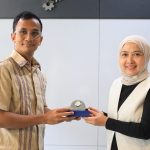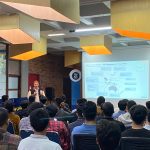VORIONE Team’s Shining Success at PIMNAS 2023 !
Students from the Faculty of Mechanical and Aerospace Engineering (FTMD) Institut Teknologi Bandung (ITB) brought honor to their campus by winning a Silver Medal in the Presentation category at the prestigious 2023 National Student Scientific Week (PIMNAS). PIMNAS is a highly competitive event that showcases the best scientific research and innovation from universities across Indonesia. The team, comprising Matthew Hu, Joshua Levin Kurniawan, Jessica Athalia Moelia Sapoetra, Bevan Bintang Setiawarman, and Jovan Eugene Hartadi, captivated the judges with their innovative project titled “VORIONE: A Vibration Resonance-Based Electricity Generator with Autonomous Adjustment Capability.” Their success at PIMNAS is a testament to their hard work, dedication, and the quality of their research.
This research originated from Prof. Gunawan’s exploration of the potential to convert vibrations into electricity. Joshua Levin explained that they discovered vibrations could be transformed into electricity, even from a simple device costing around IDR 500,000. This idea spurred the team to develop their project further and secure funding from the Student Creativity Program (PKM).
The research delved into the phenomenon of wind-induced vibrations being converted into electricity. The team conducted tests in a wind tunnel and applied various methods, such as regression analysis, to optimize their results.
When asked about the strengths that propelled them to PIMNAS, Joshua emphasized, “Our strength lies in our ability to apply complex knowledge to create something directly beneficial for society.” Their product, if commercialized, could become an affordable renewable energy solution, with a cost of around IDR 500,000 to power a lamp. They also modified an existing concept from Spain, enabling it to operate over a wider range of wind speeds, from 1.5 m/s to 10 m/s, thereby potentially revolutionizing the renewable energy sector.
The team distinguished themselves from others through their unique innovation and approach. “We didn’t just combine two concepts; we also solved more implementation issues,” Joshua explained. This innovative approach piqued the curiosity of the judges, who showed more interest during the presentation than scrutiny.
Beyond theory and simulations, the team conducted field trials. Team members Budi and Tito visited fishermen in Cirebon to test a wind turbine prototype on a 15-ton fishing boat. “We received positive feedback from the fishermen, highlighting the significant potential of this technology in reducing their dependency on diesel fuel,” Joshua added. Cirebon was chosen for its proximity to Bandung, with easy access via a 1.5-hour toll road.
In Cirebon, the team selected Kali Bondet port for their trials. Joshua mentioned, “We targeted boats weighing 5-10 tons, as most fishermen in Kali Bondet have traditional boats within this range.” The team conducted rigorous tests, despite challenges such as seasickness and high waves, to ensure the reliability and effectiveness of their project. They successfully conducted trials and received positive responses from the local fishermen, further validating the potential of their innovation.
“This specific application with the fishermen wasn’t the one presented at PIMNAS, but we focused on two other teams. However, this trial serves as valuable groundwork for further development in the coming year,” Joshua explained. The team is planning to refine the technology based on the feedback received from the fishermen and conduct more extensive sea trials in the future, demonstrating their dedication to improving and expanding the project.
The fishermen’s response was highly positive. Joshua revealed, “The fishermen hope that technology developed at the university can be returned to the community, particularly to reduce reliance on diesel generators.” They saw great potential in using this technology for offshore aquaculture, which could help lower their operational costs.
The team’s success at PIMNAS 2023 not only brought pride to their university but also opened up significant opportunities for developing more affordable and beneficial renewable energy solutions for the broader community. With their spirit of innovation and high dedication, they demonstrated that science and technology could offer real solutions to various social and environmental challenges. Their project, if implemented, could significantly reduce reliance on fossil fuels, contributing to a more sustainable and environmentally friendly future.







